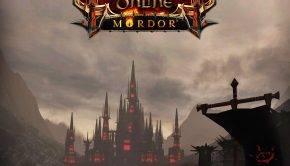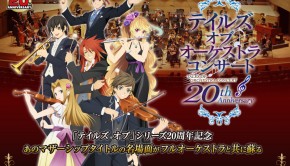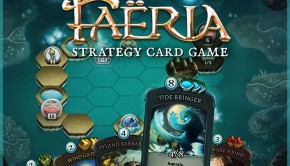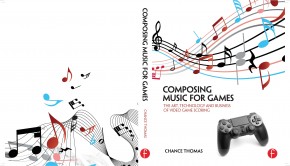Chance Thomas Interview: The Lord of the Rings Online
Few composers have as much experience in writing and recording orchestral game music as Chance Thomas. Coming from a background in television and ads, Thomas’ game soundtrack debutQuest For Glory V: Dragon Fire made history by becoming one of the very first Western game scores to deploy a live orchestra. Ever since, Chance Thomas has been a restless advocate for the cause of live game music and its recognition within the music industry and among the public at large. As Music Director of Vivendi-Universal’s Lord of the Rings game series, Thomas has — more than any other game composer — shaped gamers’ view of what Tolkien’s beloved fantasy franchise sounds like.
In this extensive interview, Thomas reflects both upon the artistic side of his creations, and his involvement with sound technology. Thomas recounts how his involvement with Quest For Glory V: Dragon Fire led to the use of a live orchestra for the game, and how this work impacted game music at large. He also details how he translated Tolkien’s fantasy trilogy into sound and ensured that his artistic vision remained consistent throughout the various Lord of the Rings games. Digging into the technical side of things, Thomas gives some insight into the scoring process of a game soundtrack, and his fascination and involvement with adaptive game music.
Interview Credits
Interview Subject: Chance Thomas
Interviewer: Simon Elchlepp
Editor: Simon Elchlepp
Coordination: Simon Elchlepp
Interview Content
Simon: Chance Thomas, thanks for taking the time today to talk about your work. To start things off, could you give us some information about your musical background, starting with your musical activities in high school and your move into scoring for television and commercials?
Chance Thomas: To get the full picture, we have to start even before high school. When I was about 10 years old, I won a role in Lyric Theater’s production of the musical Mame. While other boys were shy, I found myself loving the limelight. Speaking, singing, and dancing onstage in front of a large audience was intoxicating! The next year I was in The Music Man, and the following year appeared in the opera Der Rosenkavalier. The showbiz bug definitely bit me early in life.
Now to answer your high school inquiry. Over the summer before I started high school, guitarist Robin Bealmear and I decided to form a rock band, Manta. Manta became the central focus of our high school years. We specialized in progressive and popular rock (Kansas, Boston, Styx) and also did a bunch of original material. Writing songs for Manta was really what started me on the road to composing.

Simon: How did you end up working both as a composer and in technical roles like record engineering?
Chance Thomas: After serving a two year mission for the Mormon church in Italy, I started rethinking my professional goals. I wondered if music was really a practical career path. In fact, my scholarship to Brigham Young University was to their business school. But shortly after arriving on campus, I discovered that BYU had a synthesizer lab and a recording studio on site. I started hanging around there more and more, and within a semester had successfully switched my scholarship to the music school!
The University had just opened up a specialized track within their music degree program called Recording Engineering and Production. I was all over it. To fulfil course requirements, I would compose, perform, record and mix my own pop songs. It was like a dream come true. The training in both the creative and technical sides of music production has proven to be an indispensable foundation for my entire career. Special thanks to my personal mentor Jim Anglesey and to the Dean of the music school, Newell Dayley.
Simon: Your breakthrough as a game composer already came with your first title, Quest for Glory V: Dragon Fire. While you have probably told this story many times by now, could you recall for our readers how you got involved with this title?
Chance Thomas: I was living in Salt Lake City at the time. A neighbor mentioned in passing that a game company he liked had just listed a job posting for a composer. Would I be interested?
The sexy version of the story would have me respond with immediate enthusiasm to such an obviously awesome opportunity. But the dreadful truth is, I thought video games were nothing but a sub-species in the entertainment ecosystem. They don’t even use real music! Or so I thought. My neighbor insisted that I come to his home so he could educate me. After playing through Gabriel Knight (including the live opera scene), my enlightenment was complete.
I submitted for the position and won the job. By the way, your readers might be interested to know that Jason Hayes (World of Warcraft) was a Sierra employee at the time, and a member of the screening committee who reviewed my submission and ultimately selected me. Thanks Jason!!!
Simon: How familiar were you with game music at that time and did you approach your first game project with any preconceptions — or was it maybe a lack of preconceptions that made you ask the developers for an orchestral game score, something highly unusual back in 1996?
Chance Thomas: I didn’t know enough to understand the limitations of the technology. I came in and immediately started talking about live orchestra, layered voices, acoustic instruments, etc. But I was also tenacious enough not to back down when all of the programmers told me I was a lunatic, that it couldn’t be done. All of them, except for one.
Eric Lengyl never told me it couldn’t be done. So I bought him a pizza one night, and we brainstormed in his office for several hours on possible ways to create an adaptable audio engine capable of playing back digital audio streams. This was in 1996-1997, mind you. We were way ahead of our time.

Simon: You recorded Quest for Glory V with the Utah Film Orchestra and several soloists. Did the fact that orchestral recordings of game music were exceedingly rare pose any challenges when you prepared and recorded the orchestra? If I remember, you worked with a relatively small ensemble — how did you still elicit the desired sweeping fantasy sound from them?
Chance Thomas: I wish you could see the blank stares I received from the orchestra as I explained that we would be recording a symphonic score to a video game! It was unheard of. We were among the first in the world to record a live orchestra for a game.
But after that, it was just a bunch of talented and passionate people making music together. “Oh, that sounds cool!” “Hey, let’s try that one part again!” “Mmm, that was so NICE!” “Great job!” That sort of thing.
We had 32 members of the Utah Symphony at the recording date. We stacked the strings a couple of times, and I think we recorded two passes of brass. And then I spent several weeks mixing the tracks, blending sampled and electronic elements into the score, even writing new parts to fill in the blanks here and there.
Simon: While Quest for Glory V has all the bearings of a large-scale fantasy score, it’s also a very varied work with many delicate, elegant moments like “The Dance of Mystery and Intrigue” or “Silmarian Meanderings – Day and Night.” What inspired you to write such a colourful score, particularly given that there weren’t too many reference points for orchestral game music around at the time? Was Quest for Glory V also a chance to paint on a broader canvas after your work in TV and commercials?
Chance Thomas: Absolutely! The game world was totally inspiring to me. Terry Robinson’s incredible visual design for Lori Cole’s game just made me hear all kinds of music in my head. I just wrote what seemed to fit the look and story of the game.
And it was fun to see the soundtrack become so commercially successful. We printed up 50,000 units in the initial production run and sold them all! I have a few copies left from a secondary production run at Universal which I still sell from my website here.
Simon: Quest for Glory V was a watershed moment — certainly musically, but also in regards to its importance for the fledgling game music industry, including your work to create a Grammy category for game music after the release of the game. What was your inspiration for this drive and what were the challenges you were facing?
Chance Thomas: Talk about serendipity! Today, as I write my response to your question, I have just learned that the soundtrack for Journey has been nominated for a Grammy award! It’s the first time in history that a game score soundtrack has been an official nominee. What a thrilling moment, a milestone day for our industry!
The impetus to start my own Grammy journey began in 1998. I was attending a Grammy party in San Francisco. I decided to introduce myself to Mike Green, the President of the Recording Academy. After introducing myself as a video game composer, he sort of crinkled his nose and said, “You mean like Pac Man? Donkey Kong?” I said, “No, more like live orchestra, layered voices and classical guitar.” I then asked the DJ to play a couple of tracks from the Quest for Glory V: Dragon Fire CD (which I conveniently had tucked away in my pocket).

After listening a bit, I asked him if the Academy would ever consider a category for game music. He gave me his card and asked me to submit a proposal. The rest is history. You can read the quintessential article detailing the genesis of our movement on Gamasutra (from Feb. 2000) here.
Simon: Given how far game music has come in terms of recognition from audiences and the music industry since the late 1990s, do you think there still remains work to be done in this area?
Chance Thomas: Totally. We’re in a much better place than we were even just a few years ago. But many in the general public still see video game music as a step behind film and TV music. For that matter, the medium itself is still perceived that way. No wonder the music perception follows suit.
But the new generation is savvy. I speak periodically at Universities around the country, giving Master classes on video game scoring, orchestration, etc. Not only are the students’ iPods full of game soundtracks, but they love to perform video game music. Two examples are the Gamer Symphony Orchestra at the University of Maryland, and the Gamer Symphonic Orchestra at Colonel Zadok A. Magruder High School. These kids are also filling venues for Video Games Live and PLAY! concerts across the world. Our day is coming.
Simon: Speaking of recognition, in an interview around the time you did X-Men: The Official Movie Game, you mentioned that game music certainly matches the compositional quality of film scores, but that the resources allocated to game music still trailed those given to film soundtracks. In another interview, you also said that your music budget for the Lord of the Rings games was “literally 1/100th” of the music budget for The Return of the King. Firstly, how do you record a quality orchestral score with such limited resources, considering how expensive orchestras are? Secondly, with more and more game scores recorded in venues like Abbey Road, do you feel like the gap is closing and that orchestral game music is realising its full potential?
Chance Thomas: Dude, you have no idea. The tricks we pulled to get those original LOTR game score recordings to sound good… So without giving away all my secrets, let me just say that in the absence of significant budget, you have to innovate, scratch, and claw your way to quality. We worked very long and hard, with a dedicated few doing the lion’s share of the work. I will forever be grateful to them!
As for today, it’s funny you mention Abbey Road. One of my friends recorded a game score there recently. He had a massive orchestra and significant budget. At the same time, a film composer who everyone knows was also at Abbey Road, preparing to record his film score later in the week. The film composer was wistful at the size of orchestra my friend had for his game soundtrack, much bigger than what was budgeted for the film. An incredibly ironic turn of events!

Simon: It’s probably safe to say that your biggest musical focus in the last decade has been Vivendi-Universal’s Lord of the Rings game series, for which you’ve worked as Music Director. Could you describe in some more detail what your responsibilities as Music Director of a whole franchise are and how you coordinate the work of the artists you’ve worked with?
Chance Thomas: I loved that job. I got to work with guys like Rod Abernethy, Lennie Moore, Brad Spear, and Geoff Scott. Such talent. My role was to define what music in a Tolkien-based world should sound like, and then to make sure everyone’s personal take remained within orbit of our Tolkien musical solar system.
We started with a document called the Tolkien Music Style Guide. In this document, I outlined the primary instrumental palettes for each key race, based on references in the literature. Also vocal ranges for the various races, melodic idioms, and harmonic tendencies. I even went so far as to define a “home” key for each race, so that as you ventured out in the world, it would take you through a cycle of keys, finally coming back to your tonic key when you returned to your home territory. Pretty geeky!
Finally, I composed a cycle of themes for each race, and produced recordings and MIDI files of those themes for use in the various games. Each composer would supplement these thematic bits with their own work, often based on the underlying MIDI files from the theme cycle. Your audience can read all about it here.
Simon: Your affiliation with the Lord of the Ring franchise reaches back more than a decade, all the way to your days at Sierra Entertainment, where you spent years of research to turn J.R.R. Tolkien’s work into music. You’ve stated that your aim was to understand the role and power that Tolkien envisioned music has in his literary universe — why was this crucial to you?
Chance Thomas: Concern for my own safety, initially. Tolkien fans can be a rabid bunch, and I didn’t want to turn up on the wrong side of their ire! But then, I really began to understand just how much thought the old professor put into imagining how his world would resonate with music. This wasn’t a casual afterthought. He’d done some real thinking about music and sound in his world. I felt that if I was ever going to make any music that amounted to anything for this universe, I had better understand it from the ground up.
Simon: How much information could you literally take from the books — for example instruments that characters play — and which pieces of the puzzle did you have to fill in through your own artistic interpretation and vision?
Chance Thomas: It’s true that some things had to be inferred. But there is also a wealth of information available at our fingertips. In this picture of my books (below), you can see where I’ve inserted stick notes to mark a particular passage that tells us something about instrumentation, vocal quality, song emotion, etc. There are hundreds of them!

I would cite some representative examples for you, but I’ve loaned my copies of the books to my daughter for her Tolkien Studies class next semester. Like father like daughter.
Simon: How did you ensure that the Lord of the Rings series retained a coherent sound, despite the number of composers working on these games throughout the years?
Chance Thomas: Composers would submit their work-in-progress tracks and I would review them. I’d offer feedback and sometimes we’d rework a few tunes. Mostly, I was just blown away by everyone’s talent and creativity. There’s no question that Tolkien’s work is an unbelievably creative place to play in.
Simon: Throughout the years that you’ve worked on the Lord of the Rings franchise, do you feel that your view on the sound of Tolkien’s world still keeps evolving, even after all these years of research? Now that the musical parameters of the franchise have been set so thoroughly through your research and the numerous Lord of the Rings game scores, how do you approach a new game like Riders of Rohan and still inject it with a character of its own?
Chance Thomas: Yes, there is room for evolution, because initially we were only establishing broad strokes. Particularly with The Lord of the Rings Online, as each expansion takes us deeper into Middle-earth, I now get to flesh out details that may have only been hinted at in earlier compositions.
Because the world of Middle-Earth is so vast and rich, there is still much to be explored musically. With the templates and palettes I’ve established through long years of research, it gives me a good spring board to continue travelling. Riders of Rohan allowed me to take a very narrow slice of the original theme cycle and greatly expand upon it. The Road goes ever on and on…
Simon: Back to more technical matters: reading some of your thoughts on Quest for Glory V in other interviews, it seems obvious that you were very interested in creating non-linear music that adapts to the gamer’s actions, and this seems to remain a passion for you. Was it this interest in adaptive music that shifted your creative focus towards working on game scores and do you still keep finding ways to better immerse the player through technological advances? Given your propensity for writing live orchestral scores, how much more difficult are these to edit and mix into interactive music than let’s say MIDI music?
Chance Thomas: Oh yeah. Here’s something I like to toy with. It’s a composition map for composing three different pieces of music — three different pieces of music that can be crossfaded with perfect seamlessness at any time based on changing game states:

The composer creates a map, something like this, and each new piece of music is written to conform to the map for whatever layer you’re scoring. The end result is perfect, seamless music, transitioning anytime based on changing game states. So cool.
Music STAX is just one example of how new writing techniques can actually simplify the implementation process. There are lots of techniques, some of them much more advanced than mine, by guys lots smarter than I am. But all of these techniques make it less relevant what your origin source for music is, even live orchestra.
Simon: You have immense experience not only as a composer, but also as a music producer, editor, and other recording-related roles. On many games, you’ve also been responsible for creating the music design matrices — the algorithms that dictate how the music will be implemented into the game and change according to the gamers’ behaviour. How much easier does all this knowledge make the process of composing for you?
Chance Thomas: I think it all blends together in the brain to deliver a music score that is a good fit for interactive games. I’m not sure of all the synaptic connections and how and why they work together. Somehow they just do.
Simon: Does the process of composing music itself keep changing throughout the years with advancing technology and more sophisticated matrices?
Chance Thomas: Some things have changed. For example, I didn’t use a STAX map when I was writing my first game score. But other things don’t change at all. The most significant technology is still that grey mass between the composer’s ears. All of the best ideas take shape first in the workshop of the mind.
Imagination will always be the most essential fuel for creative undertakings. If, in my imagination, I can place myself vividly within the scene I’m scoring — then I start to hear music that reflects the emotions conjured up by the experience. Sometimes I think it’s not that different from the approach method actors take in their work.
Simon: Aside from your large-scale orchestral works, you have also written music for a number of casual games like Heroes of Might and Magic: Duel of Champions and Ghosts of Mistwood. What role do these games play in your portfolio, both artistically and financially? In how far do you have to change your approach when writing for a browser game like Ghosts of Mistwood — do they tend to be more melody-focused to quickly grab the listeners’ attention?
Chance Thomas: These games are really fun to score and don’t take themselves too seriously, which helps me not take myself too seriously! And while they don’t pay as much as some of the MMORPG or console titles I’ve worked on, let me tell you, as a freelance composer, any day someone will pay me to sit at my home and make up a tune, that’s a good day!
As for the second question, yes and no. A melodic introduction is important, but then you have to be careful to weave away from it in interesting and non-repetitive ways, since music in browser games tends to loop ad-nauseum. At least with Ghosts of Mistwood, I delivered the Main Theme in four different cycleable versions, to stave off the inevitable ear fatigue.
Simon: Many thanks for your time today, Chance Thomas. Is there anything else you’d like to say aboutRiders of Rohan or your work in general? Do you have any messages to readers from around the world?
Chance Thomas: Well, if anyone has actually managed to read this all the way to the bottom, I’m impressed, and have to say THANK YOU. I love music, and I love game music. It’s genuinely thrilling to be part of such a dynamic creative community. I am also very proud of my most recent original score,The Lord of the Rings Online: Riders of Rohan. Above is a highlight reel of sorts, accompanied by screenshots from the game and photos from our recording sessions. The album is available on iTunesnow. Enjoy!
Posted on October 1, 2013 by Simon Elchlepp. Last modified on March 19, 2014.














